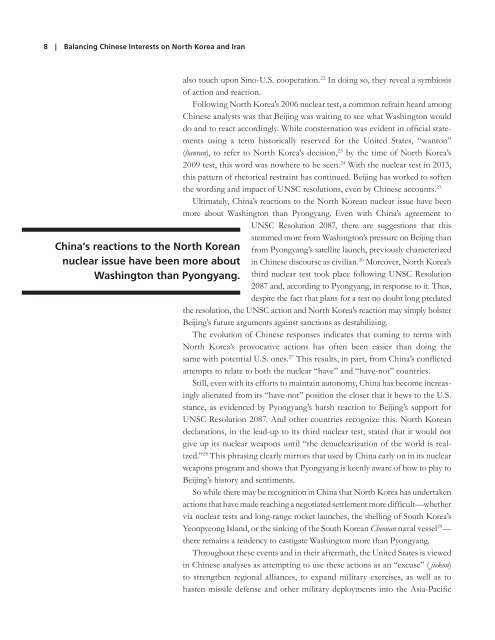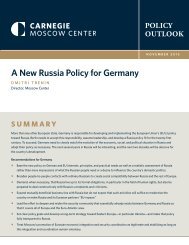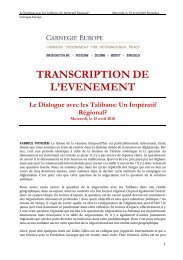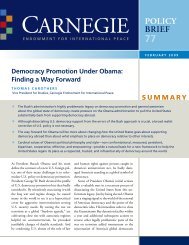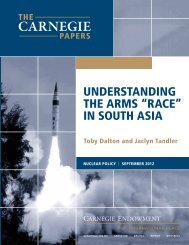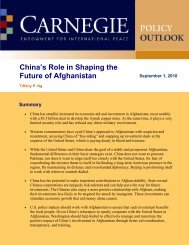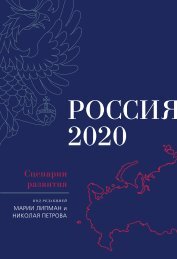BALAncIng chInese InteRests On nORth kOReA And IRAn
BALAncIng chInese InteRests On nORth kOReA And IRAn
BALAncIng chInese InteRests On nORth kOReA And IRAn
Create successful ePaper yourself
Turn your PDF publications into a flip-book with our unique Google optimized e-Paper software.
8 | Balancing Chinese Interests on North Korea and Iran<br />
also touch upon Sino-U.S. cooperation. 22 In doing so, they reveal a symbiosis<br />
of action and reaction.<br />
Following North Korea’s 2006 nuclear test, a common refrain heard among<br />
Chinese analysts was that Beijing was waiting to see what Washington would<br />
do and to react accordingly. While consternation was evident in official statements<br />
using a term historically reserved for the United States, “wanton”<br />
(hanran), to refer to North Korea’s decision, 23 by the time of North Korea’s<br />
2009 test, this word was nowhere to be seen. 24 With the nuclear test in 2013,<br />
this pattern of rhetorical restraint has continued. Beijing has worked to soften<br />
the wording and impact of UNSC resolutions, even by Chinese accounts. 25<br />
Ultimately, China’s reactions to the North Korean nuclear issue have been<br />
more about Washington than Pyongyang. Even with China’s agreement to<br />
UNSC Resolution 2087, there are suggestions that this<br />
stemmed more from Washington’s pressure on Beijing than<br />
from Pyongyang’s satellite launch, previously characterized<br />
in Chinese discourse as civilian. 26 Moreover, North Korea’s<br />
third nuclear test took place following UNSC Resolution<br />
2087 and, according to Pyongyang, in response to it. Thus,<br />
despite the fact that plans for a test no doubt long predated<br />
the resolution, the UNSC action and North Korea’s reaction may simply bolster<br />
Beijing’s future arguments against sanctions as destabilizing.<br />
The evolution of Chinese responses indicates that coming to terms with<br />
North Korea’s provocative actions has often been easier than doing the<br />
same with potential U.S. ones. 27 This results, in part, from China’s conflicted<br />
attempts to relate to both the nuclear “have” and “have-not” countries.<br />
Still, even with its efforts to maintain autonomy, China has become increasingly<br />
alienated from its “have-not” position the closer that it hews to the U.S.<br />
stance, as evidenced by Pyongyang’s harsh reaction to Beijing’s support for<br />
UNSC Resolution 2087. <strong>And</strong> other countries recognize this. North Korean<br />
declarations, in the lead-up to its third nuclear test, stated that it would not<br />
give up its nuclear weapons until “the denuclearization of the world is realized.”<br />
28 This phrasing clearly mirrors that used by China early on in its nuclear<br />
weapons program and shows that Pyongyang is keenly aware of how to play to<br />
Beijing’s history and sentiments.<br />
So while there may be recognition in China that North Korea has undertaken<br />
actions that have made reaching a negotiated settlement more difficult—whether<br />
via nuclear tests and long-range rocket launches, the shelling of South Korea’s<br />
Yeonpyeong Island, or the sinking of the South Korean Cheonan naval vessel 29 China’s reactions to the North Korean<br />
nuclear issue have been more about<br />
Washington than Pyongyang.<br />
—<br />
there remains a tendency to castigate Washington more than Pyongyang.<br />
Throughout these events and in their aftermath, the United States is viewed<br />
in Chinese analyses as attempting to use these actions as an “excuse” ( jiekou)<br />
to strengthen regional alliances, to expand military exercises, as well as to<br />
hasten missile defense and other military deployments into the Asia-Pacific


